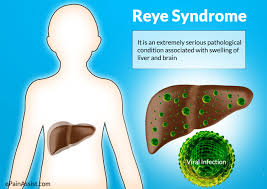Reye’s syndrome ,a rare but very serious complication of common childhood respiratory infections that causes both liver disease and inflammation of the brain (encephalitis).
Causes:
The exact cause of Reye’s syndrome is unknown, but it most commonly affects children and young adults recovering from a viral infection – typically, but not exclusively, a cold, flu or chickenpox.
In most cases, Reye’s syndrome seems to be triggered by using aspirin to treat a viral illness or infection — particularly flu (influenza) and chickenpox — in children and teenagers who have an underlying fatty acid oxidation disorder. Fatty acid oxidation disorders are a group of inherited metabolic disorders in which the body is unable to break down fatty acids because an enzyme is missing or not working properly. A screening test is needed to determine if your child has a fatty acid oxidation disorder.
Symptoms:
The symptoms of Reye’s syndrome usually begin 1-3 days after a viral infection, such as a cold, flu or chickenpox.
Initial symptoms can include:
- vomiting repeatedly
- tiredness and lack of interest or enthusiasm
- rapid breathing
- fits (seizures)
As the condition progresses, the symptoms may get more severe and more wide-ranging, and can include:
- irritability, or irrational or aggressive behavior
- Severe anxiety and confusion that’s sometimes associated with hallucinations
- Coma (loss of consciousness).
Complications:
Most children and teenagers who have Reye’s syndrome survive and some will make a full recovery. However, Reye’s syndrome can leave some people with a degree of permanent brain damage caused by the swelling of their brain. Without proper diagnosis and treatment, Reye’s syndrome can be fatal within a few days.
Long-term difficulties sometimes associated with Reye’s syndrome include:
- poor attention span and memory
- some loss of vision or hearing
- Speech and language difficulties
- Problems with movement and posture
- Difficulty swallowing
- Problems with everyday tasks, such as dressing or using the toilet
If your child develops any long-term problems, an individual care plan will be drawn up to address their needs. The plan will be reassessed as they get older.






